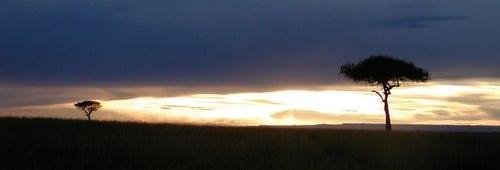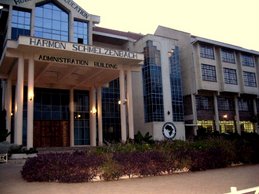.JPG) train station downtown for our trip to Mombasa. In spite of some challenges mentioned later, it's a wonderful adventure: one of the classic train trips of the world, and for a first class cabin and two meals it's a bargain at around $50 US.
train station downtown for our trip to Mombasa. In spite of some challenges mentioned later, it's a wonderful adventure: one of the classic train trips of the world, and for a first class cabin and two meals it's a bargain at around $50 US. .JPG) 6PM we were allowed to board, and promptly at 7, the train started its trip south east from Nairobi to the Muslim port city of Mombasa on the Indian Ocean.
6PM we were allowed to board, and promptly at 7, the train started its trip south east from Nairobi to the Muslim port city of Mombasa on the Indian Ocean. .JPG) history of East African railroads. SOme silverware was marked "UR" for "Uganda Railway." SOme was marked "KR" for "Kenya Railway." Some was marked "EAR&T" for "East Africa Railway and Transport." The linens were marked "RVR" for Rift Valley Railway" the current owner of the railroad we were on. We were offered first soup, and then lamb, or chicken or vegetable curry. We opted for the chicken which tasted good as we ate later than usual. So far so good. When we got back to our cabins, they had been made up with crisp sheets and pillowcases and nice blankets but, long story short, even though we were all sleepy and there was the appropriate rocking of the railroad cars, we could not get to sleep. We dozed, we woke up, we GOT up, then started the cycle again. We were conscious of the train stopping often to pick up and drop off passengers during the night, but we could not get to sleep.
history of East African railroads. SOme silverware was marked "UR" for "Uganda Railway." SOme was marked "KR" for "Kenya Railway." Some was marked "EAR&T" for "East Africa Railway and Transport." The linens were marked "RVR" for Rift Valley Railway" the current owner of the railroad we were on. We were offered first soup, and then lamb, or chicken or vegetable curry. We opted for the chicken which tasted good as we ate later than usual. So far so good. When we got back to our cabins, they had been made up with crisp sheets and pillowcases and nice blankets but, long story short, even though we were all sleepy and there was the appropriate rocking of the railroad cars, we could not get to sleep. We dozed, we woke up, we GOT up, then started the cycle again. We were conscious of the train stopping often to pick up and drop off passengers during the night, but we could not get to sleep..JPG) After a good breakfast and four more hours of travel, the train finally pulled into the Mombasa train station at 11AM--SIXTEEN HOURS after we had left Nairobi. A driver we had arranged for picked us up and took us to our hotel--a kind of faded resort directly on the Indian Ocean. We mainly crashed the rest of the afternoon, but took a walk on the beach in the evening and then spent the next day exploring Mombasa. It's famous for the ancient doors on several of the buildings in the old city. More pictures follow.
After a good breakfast and four more hours of travel, the train finally pulled into the Mombasa train station at 11AM--SIXTEEN HOURS after we had left Nairobi. A driver we had arranged for picked us up and took us to our hotel--a kind of faded resort directly on the Indian Ocean. We mainly crashed the rest of the afternoon, but took a walk on the beach in the evening and then spent the next day exploring Mombasa. It's famous for the ancient doors on several of the buildings in the old city. More pictures follow..JPG)
.JPG)
.JPG)
Left to right above (if the formatting holds!) our local guide, who for the equivalent of about 8 dollars led the three of us through the old city, past ships under repair, the old Portuguese "Fort Jesus", and the famous arab doors of the old city. We finished up our trip with a visit to the spectacular "Tamarind" restaurant located on a hill overlooking the harbor and Mombasa island. It's their black door you see among other doors below...
.JPG)
.JPG)
.JPG) Bob and Kim Cantrell from our home church in Nampa are coming in a week and planning to spend part of their time in Mombasa. These are some of the things they will see, and if you come, these are some of the things you will see as well. At the risk of "spiritualizing" things (we're glad to take the risk), the Muslim movement is on the march in Africa. There are many mosques--large and small--in Nairobi and the overwhelming number of places of worship in Mombasa are mosques. We'd ask you to pray for the Nazarene churches and for other Christian churches in the Mombasa area, that God will move in a mighty way and that people will understand the transforming Good News of the gospel.
Bob and Kim Cantrell from our home church in Nampa are coming in a week and planning to spend part of their time in Mombasa. These are some of the things they will see, and if you come, these are some of the things you will see as well. At the risk of "spiritualizing" things (we're glad to take the risk), the Muslim movement is on the march in Africa. There are many mosques--large and small--in Nairobi and the overwhelming number of places of worship in Mombasa are mosques. We'd ask you to pray for the Nazarene churches and for other Christian churches in the Mombasa area, that God will move in a mighty way and that people will understand the transforming Good News of the gospel.
.JPG)
.JPG)
.JPG)
.JPG)
.JPG)
+(2).JPG)
.JPG)
.JPG)
.JPG)
.JPG)
.JPG)
.JPG)



